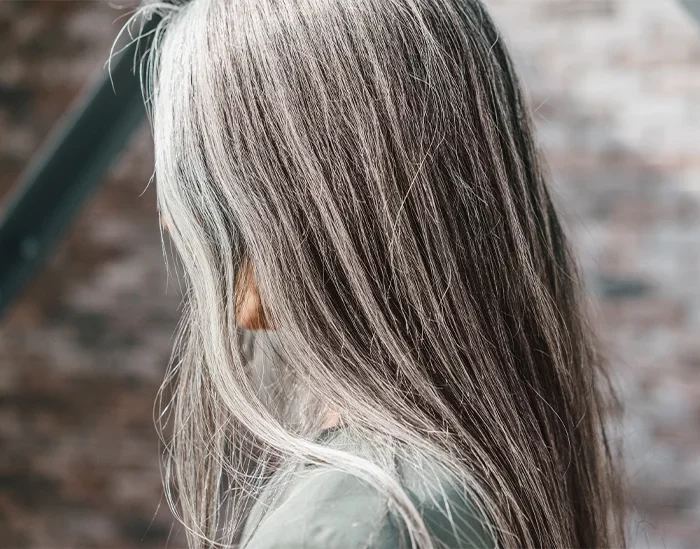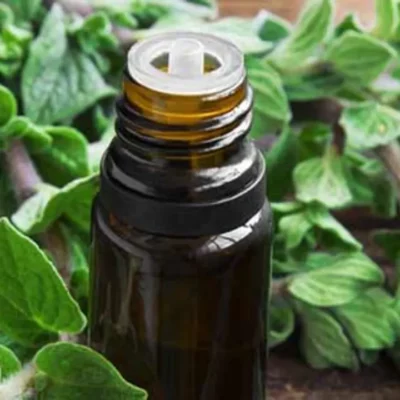
wellhealthorganic.com/know-the-causes-of-white-hair-and-easy-ways-to-prevent-it-naturally
White hair, also known as gray hair, is a common sign of aging. It occurs when the melanocytes, which are responsible for producing pigment in the hair follicles, decrease in activity and produce less melanin, the pigment that gives color to our hair. However, there are other factors that can cause premature graying or white hair, and some natural ways to prevent it. Here are some possible causes of white hair and easy ways to prevent it naturally:
Genetics:
Genetics plays a major role in determining when you will start going gray. If your parents or grandparents had premature graying, you may also be at a higher risk. Unfortunately, you can’t change your genetics, but you can take steps to delay the onset of white hair.
Genetics plays a significant role in determining the color and texture of our hair. Our genetic makeup decides the amount of melanin present in our hair follicles, which is responsible for hair pigmentation. As we age, the production of melanin decreases, leading to graying or white hair. However, genetics is not solely responsible for premature greying; other factors such as stress, pollution, and poor nutrition can also contribute to it.
The study of genetics has allowed scientists to identify specific genes and mutations that can lead to premature graying. For instance, researchers have found that variations in the gene called IRF4 are associated with gray hair at a young age. Similarly, changes in other genes such as TYR and OCA2 have been linked with early graying.
While it may be impossible to change our genetic makeup entirely, there are natural ways to help prevent premature greying. A diet rich in vitamins B12 and D3 can help maintain healthy melanin levels while reducing stress through meditation or relaxation techniques can also slow down the aging process of cells – including those found within your scalp!
Prevention tip: There is no surefire way to prevent graying due to genetics. However, you can try to delay it by maintaining a healthy lifestyle, avoiding stress, and following a nutrient-rich diet with foods like fruits, vegetables, nuts, seeds, and whole grains.
Also Read: WELLHEALTHORGANIC.COM:5-HERBAL-TEAS-YOU-CAN-CONSUME-TO-GET-RELIEF-FROM-BLOATING-AND-GAS
Nutritional deficiencies:
Deficiencies in certain vitamins and minerals, such as vitamin B12, vitamin D, copper, and zinc, have been linked to premature graying. These nutrients play a role in the production of melanin, and their deficiency can affect the pigmentation of your hair.
One common nutritional deficiency that can lead to premature graying of hair is a lack of vitamin B12. This essential vitamin is crucial for healthy red blood cells and proper nerve function. A deficiency in B12 can also cause fatigue, weakness, and cognitive problems. Consuming foods rich in B12 such as meat, fish, eggs, and dairy products or taking a supplement can help prevent this deficiency.
Iron deficiency is another possible cause of premature gray hair. Iron is critical for the production of hemoglobin which carries oxygen to our cells throughout the body. When we don’t have enough iron, our body cannot produce enough hemoglobin which can result in anemia and other health problems including early graying of hair. Eating iron-rich foods like red meat, poultry, seafood, beans and leafy greens or taking an iron supplement may help prevent this issue.
Lastly, zinc plays a vital role in many bodily functions including DNA synthesis and immune system regulation. It also helps with protein synthesis which is necessary for healthy hair growth. A zinc deficiency has been linked to premature graying of hair as well as thinning hair and balding. Foods high in zinc include oysters, beef liver, pumpkin seeds, nuts and whole grains or alternatively you can take a zinc supplement if needed.
Prevention tip: Make sure to have a well-balanced diet that includes foods rich in these essential nutrients. Include foods like fish, eggs, dairy products, leafy green vegetables, nuts, seeds, and whole grains in your diet. If you suspect a deficiency, consult a healthcare professional for proper diagnosis and supplementation.
Oxidative stress:
Oxidative stress occurs when there is an imbalance between the production of harmful free radicals and the body’s ability to neutralize them. Oxidative stress can damage the melanocytes in the hair follicles, leading to premature graying.
Oxidative stress is a term used to describe an imbalance between the production of free radicals and antioxidants in the body. Free radicals are molecules that can cause damage to cells, proteins, and DNA if they are not neutralized by antioxidants. This damage can lead to premature aging of cells, tissues, and organs – including hair follicles.
When oxidative stress occurs within hair follicles, it can result in the depletion of melanin (the pigment that gives hair its color). This leads to gray or white hairs appearing on the head. Additionally, oxidative stress can also cause hair loss by damaging the cells responsible for hair growth.
To combat oxidative stress in the body naturally, individuals should consume a diet rich in antioxidants such as fruits and vegetables. Additionally, reducing exposure to environmental toxins (such as cigarette smoke and pollution) can also help minimize oxidative stress. Consuming supplements like Vitamin E or selenium may be helpful as well for preventing oxidative stress related issues with one’s hair health.
Prevention tip: Consume antioxidant-rich foods, such as berries, citrus fruits, leafy greens, and green tea, as they can help combat oxidative stress. You can also limit exposure to environmental pollutants and avoid smoking, which can increase oxidative stress in the body.
Also Read: WELLHEALTHORGANIC.COM:EASY-WAY-TO-GAIN-WEIGHT-KNOW-HOW-RAISINS-CAN-HELP-IN-WEIGHT-GAIN
Hair care practices:
Certain hair care practices, such as using harsh chemicals, excessive heat styling, and vigorous combing or brushing, can damage the hair shaft and weaken the melanocytes, leading to premature graying.
White hair is a common concern for people of all ages. While genetics play a major role in determining the color of your hair, there are several other factors that can contribute to premature graying or whitening of hair. These include stress, lack of proper nutrition, smoking, and certain medical conditions. To prevent white hair naturally, it’s essential to adopt healthy lifestyle practices such as eating a well-balanced diet with plenty of vitamins and minerals.
One easy way to prevent white hair is by massaging your scalp with coconut oil regularly. Coconut oil contains lauric acid and fatty acids that nourish the hair follicles from within and help prevent premature graying. Another natural remedy for preventing white hair is by using onion juice on your scalp once a week. Onion juice contains sulfur which helps maintain the natural color of your hair while also promoting growth.
In addition to these remedies, it’s important to avoid harsh chemical treatments like coloring or straightening which can damage the hair follicles leading to further graying or whitening of the strands. By adopting these simple yet effective measures you can maintain healthy and lustrous locks while preventing premature greying or whitening naturally.
Prevention tip: Opt for gentle hair care practices. Use natural or mild hair care products that do not contain harsh chemicals, limit the use of heat styling tools, and be gentle while combing or brushing your hair to minimize hair shaft damage.
Stress:
Chronic stress has been linked to premature graying. Stress disrupts the normal functioning of the body, including the melanocytes in the hair follicles, and can accelerate the graying process.
Stress can be a major contributor to premature graying of hair. When the body is under stress, it releases a hormone called cortisol, which can cause damage to melanin-producing cells in the hair follicles. This ultimately leads to premature graying of hair. Stress management techniques such as meditation or exercise can help reduce cortisol levels and prevent further damage.
In addition, stress can also cause hair loss or thinning. Chronic stress can trigger an autoimmune response that attacks the hair follicles, leading to a condition called alopecia areata. Managing stress through relaxation techniques and lifestyle changes such as regular exercise and adequate sleep may help reduce the risk of hair loss due to stress.
It’s important to prioritize self-care and stress management in order to maintain healthy hair and overall well-being. Seeking support from friends, family, or a mental health professional may also be helpful in managing chronic stress levels.
Prevention tip: Practice stress management techniques, such as exercise, meditation, yoga, and deep breathing, to reduce stress levels. Getting enough sleep, maintaining a healthy work-life balance, and seeking support from friends, family, or a therapist can also help manage stress.
Amla (Indian gooseberry):
Amla is known for its antioxidant properties and has been used in traditional Ayurvedic medicine to promote hair health and delay graying.
Amla, also known as Indian gooseberry, is a popular fruit in Ayurvedic medicine that has been used for centuries to promote hair growth and prevent premature greying. It is rich in vitamin C and antioxidants that help to nourish the hair follicles and improve blood circulation in the scalp. Amla oil can be massaged onto the scalp to strengthen hair roots, prevent dandruff and promote healthy hair growth.
In addition to its topical benefits, consuming amla juice or powder orally can help prevent premature greying of hair by providing essential nutrients like iron and calcium to the body. The high vitamin C content in amla helps to boost collagen production which is important for maintaining healthy skin and hair. Adding a few pieces of dried amla or drinking fresh amla juice regularly can also improve digestion which indirectly impacts overall health, including the health of your scalp and hair.
Overall, incorporating amla into your daily routine can help prevent premature greying of hair naturally while providing numerous other health benefits as well. Whether applied topically or consumed orally, this superfood should definitely have a place on your list of natural remedies for healthier-looking locks.
Prevention tip: You can consume amla in various forms, such as raw, juice, or as a supplement, to help promote hair health and delay graying.
Remember, preventing white hair naturally may not be completely possible as it is a natural part of the aging process. However, adopting a healthy lifestyle, including a well-balanced diet, managing stress, and using gentle hair care practices, may help delay the onset of white hair and promote overall hair health. Consult a healthcare
FAQ
Q: What causes white hair?
A: White hair, also known as gray hair, is primarily caused by a decrease in melanin production in the hair follicles due to aging. Other factors that can cause white hair include genetics, nutritional deficiencies, oxidative stress, hair care practices, and stress.
Q: Can white hair be prevented naturally?
A: While white hair is a natural part of the aging process and cannot be completely prevented, there are some natural ways to delay its onset. These include maintaining a healthy lifestyle with a nutrient-rich diet, managing stress, avoiding harsh hair care practices, and using antioxidant-rich products or supplements like amla (Indian gooseberry).
Q: How can genetics affect white hair?
A: Genetics play a major role in determining when you will start going gray. If your parents or grandparents had premature graying, you may also be at a higher risk of developing white hair at an earlier age.
Q: Can nutritional deficiencies cause white hair?
A: Yes, deficiencies in certain vitamins and minerals, such as vitamin B12, vitamin D, copper, and zinc, have been linked to premature graying or white hair. These nutrients play a role in melanin production, and their deficiency can affect the pigmentation of the hair.
Q: Can stress cause white hair?
A: Yes, chronic stress has been associated with premature graying or white hair. Stress can disrupt the normal functioning of the body, including the melanocytes in the hair follicles, and accelerate the graying process.
Q: Are there any natural remedies for white hair?
A: While there is no proven cure for white hair, some natural remedies, such as using amla (Indian gooseberry) in various forms like raw, juice, or supplements, have been traditionally used in Ayurvedic medicine to promote hair health and delay graying. However, it’s important to note that scientific evidence for their effectiveness is limited and consulting a healthcare professional is advisable.
Q: Can hair care practices affect white hair?
A: Yes, certain harsh hair care practices, such as using excessive heat styling, using harsh chemicals, and aggressive combing or brushing, can damage the hair shaft and weaken the melanocytes, leading to premature graying or white hair. Using gentle hair care practices is recommended to minimize hair shaft damage.











